Gut Health and Child Survival
May 26, 2023
Global WACh participates in the DGH LAPIS Symposium
Categories: Conferences, Family Planning, Gut Health and Child Survival, Implementation Science, PrEP, Research
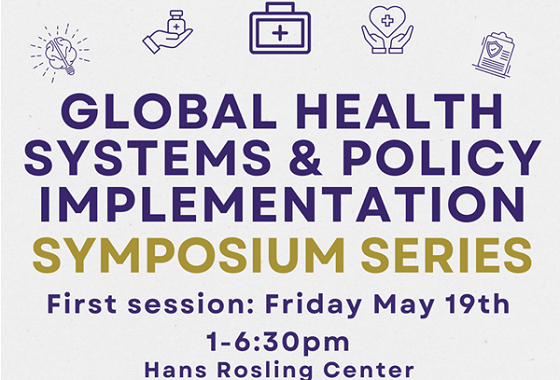
On May 19th in the Hans Rosling Center, the Learning for Action in Policy Implementation and Health Systems (LAPIS) Initiative–a resource hub aiming to foster collaboration across the Department of Global Health and support the integration of health policy or health systems objectives into research grants and training–held its first event in the Global Health Systems and Policy Implementation Symposium Series. The event included lightning talk sessions, poster abstract sessions, and opportunities for networking. Multiple centers, programs, and initiatives of the department, including Global WACh, participated in the symposium to showcase their efforts in health systems strengthening, policy implementation research, and education and training. (more…)
February 10, 2023
New CHAIN Network research integrate machine learning to strengthen efforts to identify high-risk children during paediatric hospitalizations
Categories: Gut Health and Child Survival, Publication, Research
New research from the Childhood Acute Illness and Nutrition Network (CHAIN) Network published in the Lancet’s discover series, eClinicalMedicine, applied machine learning algorithms to data collected on hospitalized children from six countries in sub Saharan Africa and Asia. The data showed that children with severe wasting, nutritional oedema, signs of sepsis, or evidence of renal insufficiency experienced extremely high rates of mortality. The authors concluded that developing novel interventions to treat these common comorbidities is a potentially important alternative to continued investment in incremental changes to the current WHO syndromic management approach. Click here to read the publication titled, “Characterising paediatric mortality during and after acute illness in Sub-Saharan Africa and South Asia: a secondary analysis of the CHAIN cohort using a machine learning approach.”
January 9, 2023
Dr. Claire Gwayi-Chore presents DeWorm3 findings on optimal delivery of community-wide mass drug administration for intestinal parasitic worm infections
Categories: Conferences, Gut Health and Child Survival, Research
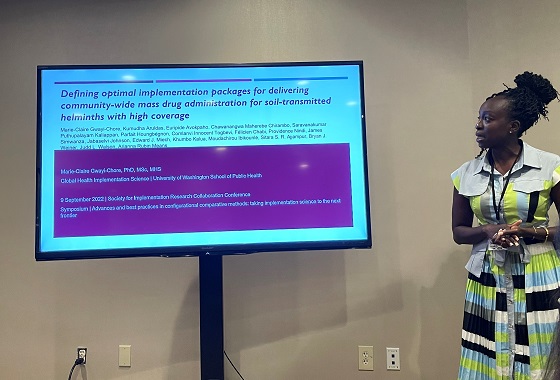
Dr. Claire Gwayi-Chore presents at the 2022 Society for Implementation Research Collaboration Conference.
The DeWorm3 Study recently published findings regarding the cost, acceptability, and optimal delivery of community-wide mass drug administration (cMDA) for or parasitic intestinal worms (soil-transmitted helminths (STH)), in Benin, India, and Malawi. As part of the efforts to disseminate these findings, Dr. Claire Gwayi-Chore, Project Lead of several neglected tropical diseases studies at Global WACh, presented at the Society for Implementation Research Collaboration (SIRC) Conference in San Diego, CA in September 2022. Dr. Gwayi-Chore’s presentation highlighted the objective of the DeWorm3 implementation science (IS) research, to generate evidence of sustainable and scalable deworming models for possible STH transmission interruption.
December 30, 2022
Researchers present latest scientific findings at ASTMH 2022
Categories: Conferences, Gut Health and Child Survival, Research
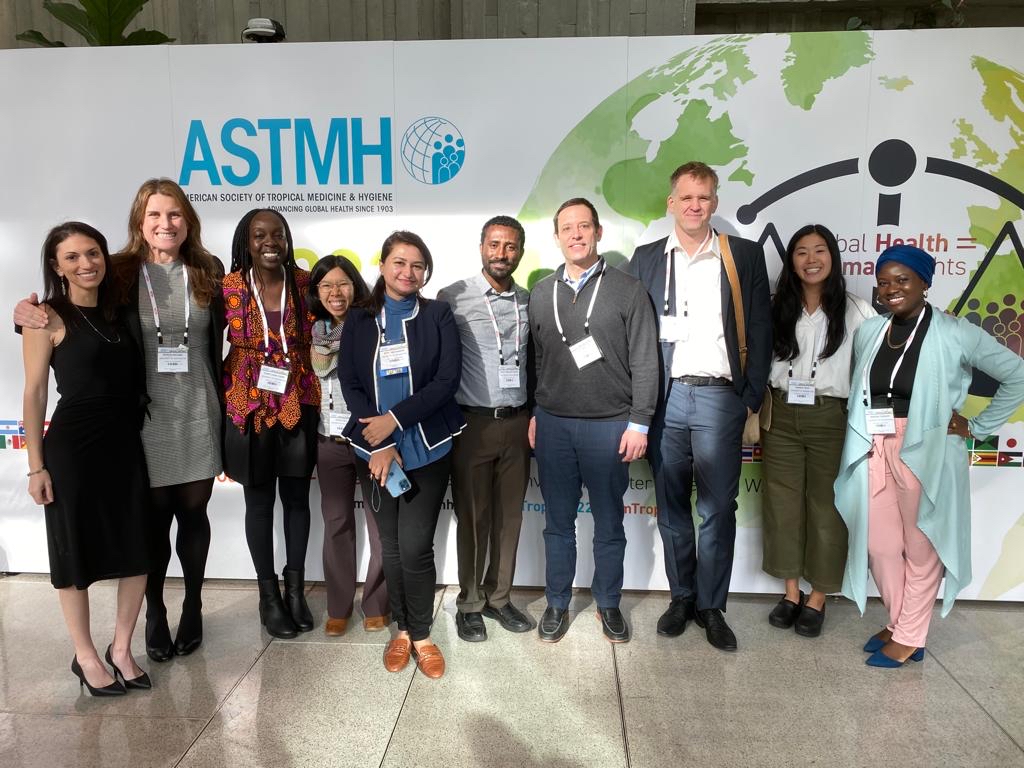
Global WACh researchers from left to right: Stephanie Tornberg-Belanger, Patricia Pavlinac, Marie-Claire Gwayi-Chore, Esther Choo, Shawon Riffat Ara, Adino Tsegaye, Judd Walson, Kirk Tickell, Hannah Atlas, Mame Mareme Diakhate (Credit: Stephanie Tornberg-Belanger)
Global WACh faculty, staff, and students attended the annual American Society of Tropical Medicine & Hygiene (ASTMH) held in Seattle, WA from October 30 to November 3, 2022. ASTMH is the premier international forum for the exchange of scientific advances in tropical medicine, hygiene, and global health.
Our researchers contributed to 11 poster abstracts and two oral presentations and facilitated a symposium featuring the latest scientific findings from their research. These findings could inform strategies to implement mass drug administration for soil-transmitted helminths to combat childhood malnutrition to improve management of diarrhea among children and improve childhood survival of preventable diseases. See a roundup of the abstracts below. (more…)
September 16, 2022
Kikundi releases 2022 Annual Report and launches new partner website
Categories: Gut Health and Child Survival
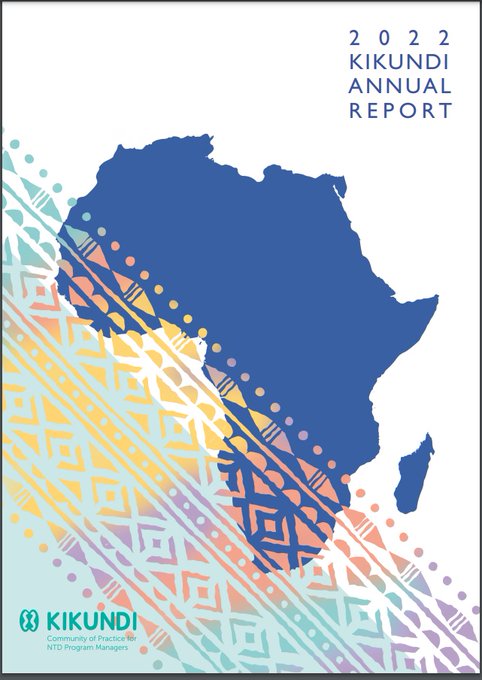 Kikundi, a Community of Practice for Neglected Tropical Disease Program Managers in Africa supported by Global WACh’s Gut Health and Child Survival Team and the University of Global Health Equity in Rwanda, recently released its 2022 Annual Report. The report highlights the Kikundi leadership structure, membership, progress in meeting Program Manager priorities, and other exciting updates from the first year of the Community of Practice. Click here to read the report.
Kikundi, a Community of Practice for Neglected Tropical Disease Program Managers in Africa supported by Global WACh’s Gut Health and Child Survival Team and the University of Global Health Equity in Rwanda, recently released its 2022 Annual Report. The report highlights the Kikundi leadership structure, membership, progress in meeting Program Manager priorities, and other exciting updates from the first year of the Community of Practice. Click here to read the report.
Kikundi also announced the launch of Kikundi’s new interactive homepage. With the new homepage, partners now have access to more information about platform successes, a Kikundi membership map, the latest on Twitter, and more. Check it out at ntdcop.org.
August 18, 2022
DeWorm3 generates evidence about the cost, acceptability, and optimal delivery of community-wide mass drug administration
Categories: Children, Gut Health and Child Survival, Publication, Research
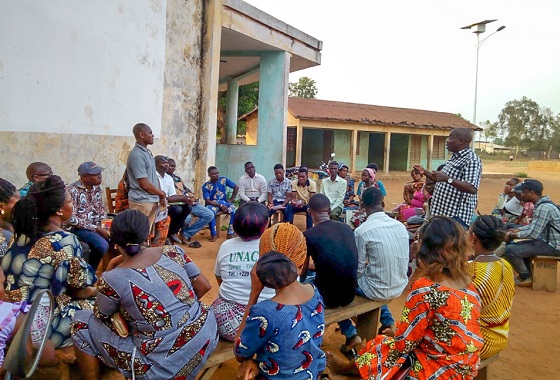
A community sensitization meeting in Benin. Photo courtesy of DeWorm3.
The DeWorm3 Study is an ongoing series of community cluster randomized controlled trials that use a community-wide drug administration (cMDA) approach to determine whether deworming both children and adults can disrupt the transmission of soil-transmitted helminth (STH), or parasitic intestinal worms, across multiple geographies including India, Malawi, and Benin. Achieving high coverage in DeWorm3 is therefore essential to improve the impact of cMDA and limit transmission of STH infections that can result in disabling chronic conditions, delayed growth and cognitive development, severe social stigma, and lost economic productivity.
The DeWorm3 research team recently published three new publications in BMJ Open and BMC Health Services regarding cMDA implementation with findings on the optimal implementation packages for delivering high coverage cMDA for STH, the costs of cMDA vs school-based deworming (SBD), and the implementation climate for cMDA for STH. (more…)
May 25, 2022
New publication on childhood mortality during and after acute illness in Africa and South Asia in the Lancet Global Health
Categories: Gut Health and Child Survival, Publication, Research
The April 2022 publication of the Lancet Global Health featured a new publication by CHAIN Network researchers at UW’s Global WACh Research Center and our international partners – “Childhood mortality during and after acute illness in Africa and South Asia” a prospective cohort study”. The study aimed to investigate the rates of and associations behind deaths in hospitalized children across nine hospitals in six countries in sub-Saharan Africa and South Asia. The study included 3,101 children and their caregivers, and revealed that out of the 350 deaths recorded, 48% were within six months of discharge from the hospital. (more…)
November 29, 2021
Researchers present findings related to diarrhea and bacterial illness treatments at ASTMH 2021
Categories: Conferences, Gut Health and Child Survival, Research
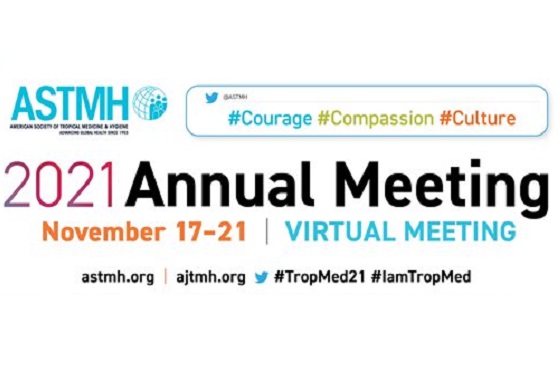 This year, the 2021 American Society of Tropical Medicine & Hygiene conference was held virtually from November 17th-21st. The annual meeting is the premier international forum for the exchange of scientific advances in tropical medicine, hygiene, and global health. Researchers from Global WACh’s Gut Health and Child Survival scientific priority group presented on data from studies focusing on diarrhea and bacterial illness treatments. (more…)
This year, the 2021 American Society of Tropical Medicine & Hygiene conference was held virtually from November 17th-21st. The annual meeting is the premier international forum for the exchange of scientific advances in tropical medicine, hygiene, and global health. Researchers from Global WACh’s Gut Health and Child Survival scientific priority group presented on data from studies focusing on diarrhea and bacterial illness treatments. (more…)
November 17, 2021
Collaborative research consortium aims to measure incidence of Shigella diarrhea and consequences to support future vaccine trial
Categories: Gut Health and Child Survival, Research
In low- and middle-income countries, nearly one third of children experience at least one episode of Shigella-attributable diarrhea during their first 2 years of life. In addition to Shigella being a leading cause of diarrhea, this enteric bacterium is also associated with linear growth faltering, a precursor to stunting. Stunting is a marker of vulnerability to childhood infection, decreased vaccine efficacy and lifelong morbidity. Currently, several promising Shigella vaccines are in development. Eventual Phase 2b/3 Shigella vaccine trials will require a consortium of potential vaccine trial sites in settings with a high incidence of Shigella-attributed medically-attended diarrhea, high participant retention, and the laboratory capacity to confirm Shigella infection.
With this goal in mind, a research consortium funded by the Bill & Melinda Gates Foundation is supporting a new surveillance study titled, “Enterics for Global Health,” also known as “EFGH.” Over a two-year period, the EFGH study will enroll 9,800 children (1,400 per country site) between 6-35 months to establish the incidence and consequences of moderate-to-severe diarrhea caused by Shigella within seven country sites in Africa (The Gambia, Kenya, Malawi, Mali), Asia (Bangladesh, Pakistan), and Latin America (Peru). The EFGH-Consortium is being co-led by EFGH Country Site Principal Investigators (PIs) and Dr. Patricia Pavlinac, Global WACh’s Gut Health & Child Survival Co-Director. and The EFGH Country Site PIs and their research teams bring years of experience leading and collaborating on epidemiological studies and clinical trials focused on disease control and elimination, vaccination, and maternal and child health.
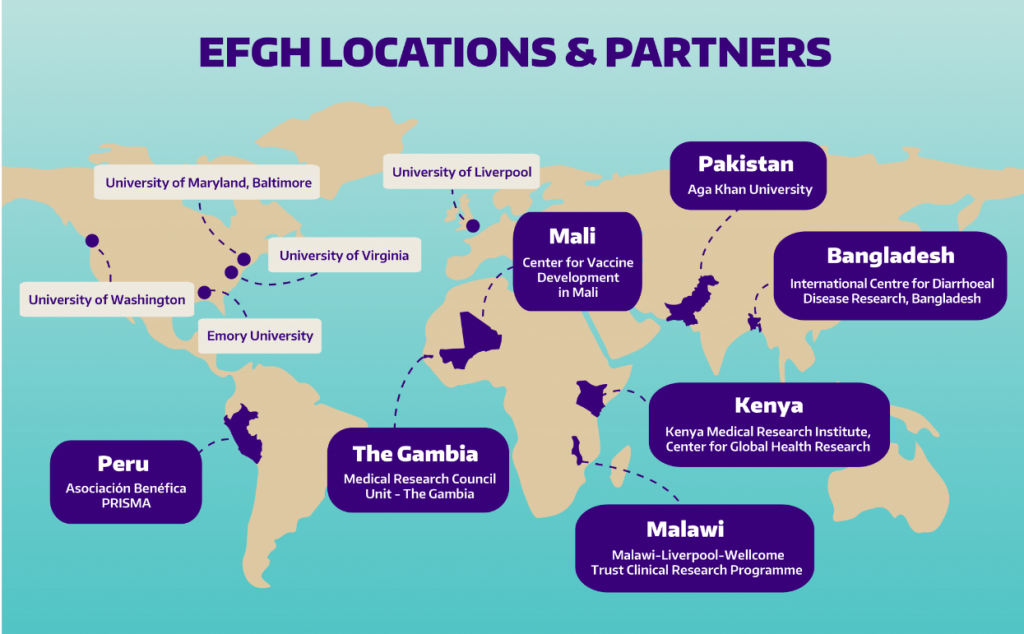
Visit the newly launched website to learn more about the EFGH project and see a full list of EFGH team members here. Continue reading for highlights of the breadth of experience, expertise, and attributes gained from each site.
May 21, 2021
New Community of Practice supports Neglected Tropical Diseases Program Managers in Africa
Categories: Gut Health and Child Survival, Research
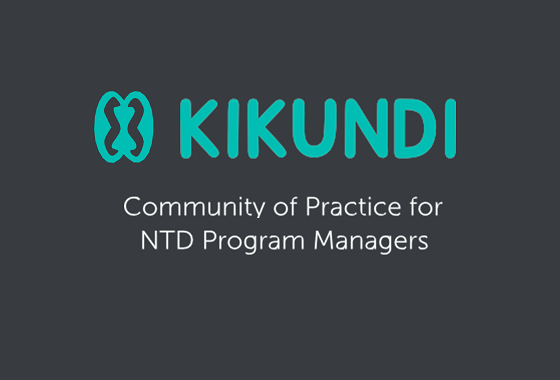
Kikundi, meaning “group” in Kiswahili, is a new online platform for NTD African Program Managers to work towards eliminating neglected tropical diseases. The logo is a West African Adinkra symbol signifying togetherness.
The Global WACh Gut Health and Child Survival team, in partnership with the University of Global Health Equity in Rwanda recently launched Kikundi, a Community of Practice (CoP) for Neglected Tropical Diseases (NTDs) Program Managers in Africa. Kikundi is the Kiswahili word for “group,” which fittingly describes this CoP that aims to foster connection among Program Managers, and ultimately help them in achieving national and global NTD elimination benchmarks.
(more…)
Previous page Next page